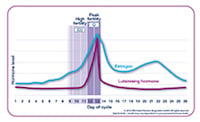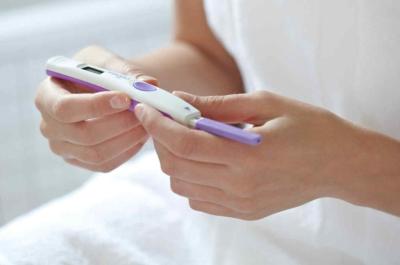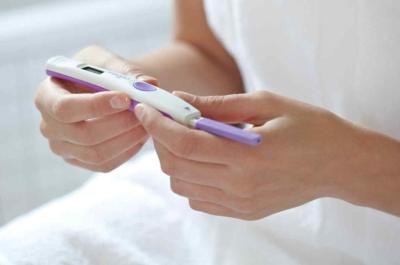
Many couples assume they’ll get pregnant quickly. However, it’s quite normal for it to take up to a year for a couple under 35 and in good health to conceive.
- Just over a third of healthy couples will conceive in the first month of trying1.
- If you’re under 35 and in good health, it’s perfectly natural for it to take up to a year.
- It can take longer if you are older, however, for women aged 38, 67% who have regular unprotected sexual intercourse will still get pregnant after two years of trying2.
- As many as one in two couples may be trying to conceive at the wrong time3. Because you can only conceive on the days before and the day of ovulation, it is important for intercourse to happen during this time.
- It is estimated that approximately one in seven couples has difficulty conceiving4.
- Clearblue Ovulation Tests are at least 99% accurate at detecting your luteinising hormone (LH) surge which occurs 24-36 hours prior to ovulation.
- While severe stress is never healthy, unless it’s interrupting your periods or sex life, it won’t stop you from conceiving.
How long does it take?
Once a couple starts trying to conceive, they expect and want pregnancy to happen quickly. More than half of women expect to become pregnant within six months, with younger women tending to expect it to happen more quickly. However, in a study of over 1,400 women who had planned their most recent pregnancy, 30-44% found it took longer than expected5.
A common, and easily remedied, factor is mistiming of intercourse6. As many as half of all couples may be trying to conceive at the wrong time, because they don’t know when their most fertile days are3.
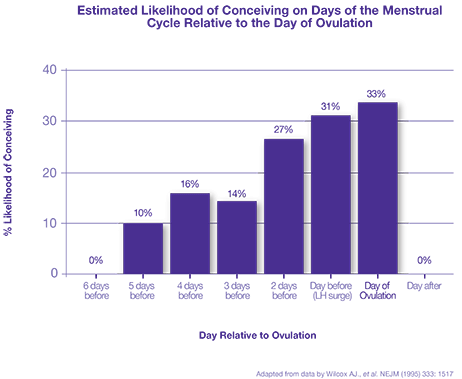
As the graph above shows, you are most likely to conceive if you time intercourse on the day of ovulation on the day before (when you detect the LH surge) but you still have a chance of falling pregnant on the days leading up to ovulation.
If you have been trying to get pregnant for longer than a year, it is recommended that you seek medical opinion.
What can I do to get pregnant faster?
You can increase your chances of becoming pregnant if you time intercourse for the day of ovulation (when your body releases an egg) or the days before.
Ovulation tests detect the surge of a hormone called LH (luteinising hormone) which peaks 24 – 36 hours prior to ovulation. Using an ovulation test as soon as you start trying to conceive will help you understand your menstrual cycle and quickly identify any cycle length irregularities. While an ovulation test may not be able to remove your stress completely, it can give you confidence that you are maximising your chances of getting pregnant.
Clearblue Ovulation Tests are at least 99% accurate at detecting your LH surge.
If after three monthly cycles you have not detected ovulation (peak fertility), we would advise you to see your doctor.
Understand hormonal changes throughout your cycles
Can age affect my ability to get pregnant?
If you are over 35 then, perhaps try for just six months before getting help. And if you’re 40 or over it is advisable to go and see your doctor as soon as you decide to try for a baby.
The reason the advice above varies by age, is that your age is a key factor in likelihood to get pregnant. A woman’s natural fertility will already start to decline in her late 20’s due to the fact she has fewer eggs and the quality of the remaining eggs is likely to be lower than when she was younger.
After 35 years old egg depletion is at a critical level and after 40 years old the chances of achieving pregnancy are very much lower. This is true not only for natural conception but also for assisted conception.
According to the Human Fertilisation and Embryology Authority, about 95% of women aged 35 who have regular unprotected sexual intercourse will get pregnant after three years of trying, but for women aged 38, only 75% will do so2.
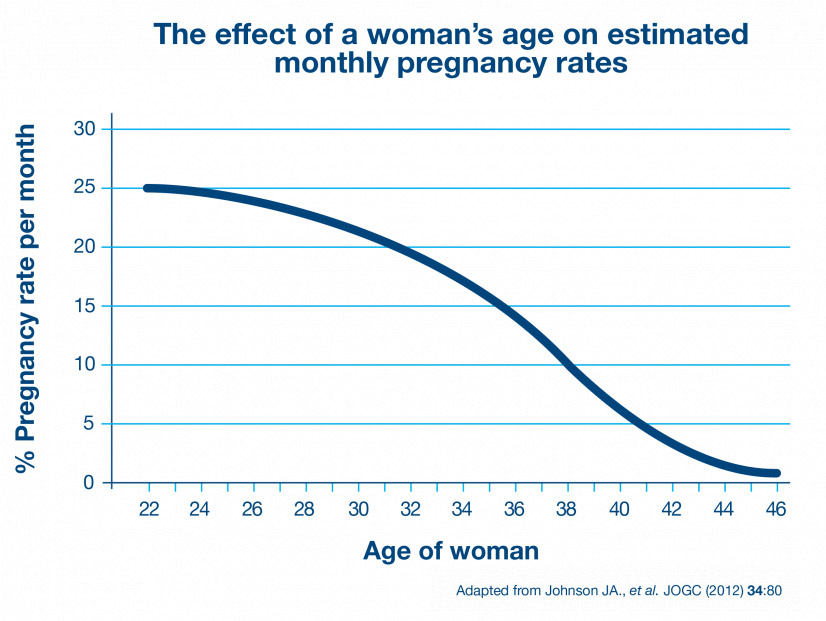
The graph above shows the effect of age on the declining chances of conception.
Professor Bill Ledger, Fertility Specialist
We know that enthusiasm for and enjoyment of sex can rapidly wane when attempts at conception fail, bringing pressure on the relationship. In addition, women nowadays tend to be older when they first try to conceive and so cannot afford to be as relaxed about time to conception as in earlier generations. This is particularly important when the couple plans two or three children.
The Clearblue Advanced Fertility Monitor is a device of its time and has a wide application for women who wish to conceive as quickly as possible and who want to understand how their body works. I’m happy to recommend it to my patients.
Can stress affect fertility?
Stress probably has a minimal impact on a women's ability to get pregnant. Studies have shown that elite athletes and women with low female hormone production (eating disorders, low weight issues) activate their stress hormones, which can have an impact on their ability to release an egg. However, normal day to day stress may not have as much of an impact on your ability to conceive. Usually stressful situations are short term and don't have an on-going effect on your fertility.
It had been suggested that using ovulation tests to time intercourse on the most fertile days could be stressful, but a study by Professor William Ledger and Clearblue found that using these tests is no more stressful than trying to conceive without them. In fact, in this study 77% more women got pregnant in the group that were using the tests7.
Additional questions
I’ve already had a child but am struggling to conceive again
Professor Michael Thomas
A number of factors can impede your ability to get pregnant even after having had a child in the past. The most common issue is your current age. If you had a child in the past and you are now over the age of 35 years, your ability to get pregnant may be decreased. You may also have developed a problem with your ability to ovulate consistently or a polyp or fibroid in the uterine cavity that may impact an embryo's ability to implant and thrive. Also, your male partner may have a sperm abnormality that has caused a decrease in his sperm count, motility or shape. If you are at all concerned consult your healthcare professional.
I had a termination in the past; could it affect my ability to get pregnant now?
Professor Michael Thomas
Usually a pregnancy termination will not affect your ability to get pregnant in the future. On rare occasions, you may develop adhesions in the uterus that can cause issues with future fertility. If you are having normal monthly cycles, the chances of these adhesions affecting your fertility are low. Seeing your fertility specialist or gynecologist will be helpful in making sure your uterus has not been affected if you have been attempting pregnancy for one year, are under the age of 35 and have cycles between 23-35 days long. If you are over 35, consider a consultation after six months, and immediately if over 40.
- 1. Gnoth C., et al. Hum Reprod. (2003) 18 (9): 1959-1966.
- 2. National Collaborating Centre for Women’s and Children’s Health (NCBI). Fertility: Assessment and Treatment for People with Fertility Problems (Section 5). .
- 3. Johnson SR., et al. Hum. Repro. (2011) 26: i236.
- 4. National Institute for Clinical Excellence (NICE) Clinical Guideline, 2013. Fertility - assessment and treatment for people with fertility problems.
- 5. Johnson SR and Pion C. Royal College of Gynaecologists World Congress 2013. Poster EP2.10.
- 6. Robinson J. and Ellis J. Current Medical Research and Opinion. (2007) 23: 301–306.
- 7. Tiplady S., et al. Human Reproduction. (2013) 28(1): 138-151.

Advanced digital ovulation test
In every cycle there are only a few days when a woman can conceive, so having sex on these days is very important if you are trying to get pregnant. The Clearblue® Advanced Digital Ovulation Test is the first and ONLY test that typically identifies 4 or more fertile days each cycle.
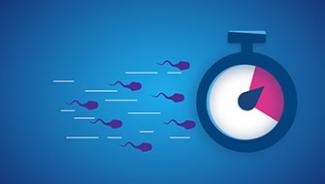
How to get pregnant faster?
Having sex at the right time of your cycle is key, so identifying your fertile days with an ovulation test will help you get pregnant faster.

